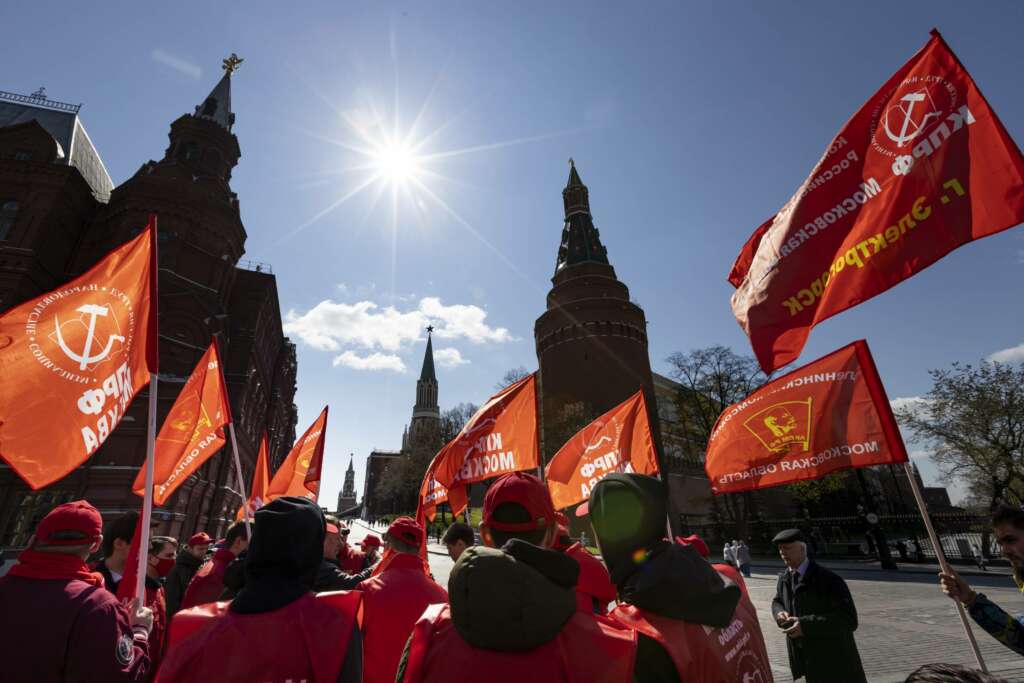
PARIS (AP) — Workers and union leaders dusted off bullhorns and flags that had stayed furled during coronavirus lockdowns for slimmed down but still boisterous — and at times violent — May Day marches on Saturday, demanding more labor protections amid a pandemic that has turned economies and workplaces upside down.
In countries that mark May 1 as International Labor Day, the annual celebration of workers’ rights produced a rare sight during the pandemic: large and closely packed crowds, with marchers striding shoulder-to-shoulder with clenched fists behind banners.
In Turkey and the Philippines, police prevented the May Day protests, enforcing virus lockdowns and making hundreds of arrests. In France, some marchers battled with riot police.
For labor leaders, the day was a test of their ability to mobilize workers in the face of the profound economic disruptions.
In France, thousands took to the streets with union banners and flags, hemmed in by and sometimes scuffling with riot police. The face masks worn by many marchers were a reminder of how much life has changed since the last traditional May Day celebrations — in 2019, before the spreading coronavirus wrecked lives and livelihoods and eroded civil liberties, often including the right to demonstrate.
Riot police clashed with some demonstrators in Paris and the southern city of Lyon, while burning roadblocks threw clouds of smoke into the Paris air. Police charged crowds to catch suspected troublemakers and fired small amounts of tear gas. Police in Paris said they made 34 arrests. Authorities also reported five arrests and 27 police officers injured in Lyon. But most of the dozens of marches across France passed off without incident.
Some demonstrations, constricted by coronavirus restrictions, were markedly less well-attended than those before the pandemic. Russia saw just a fraction of its usual May Day activities amid a coronavirus ban on gatherings. The Russian Communist Party drew only a few hundred people to lay wreaths in Moscow. For a second straight year in Italy, May Day passed without the usual large marches and rock concerts.
But in France, Germany and other places where rallies were allowed, workers vented their concerns over jobs and protections. In Bosnia, coal miner Turni Kadric said he and his colleagues are “barely surviving.”
In Indonesia, Southeast Asia’s largest economy, thousands voiced anger at a new jobs law that critics fear will reduce severance pay, lessen restrictions for foreign workers and increase outsourcing as the nation seeks to attract more investment. Protesters in the capital of Jakarta laid mock graves on the street to symbolize hopelessness and marches were being held in some 200 cities.
In the Philippine capital of Manila, where a monthlong coronavirus lockdown has been extended by two weeks amid a surge in infections, police prevented hundreds of workers from demonstrating at a public plaza, protest leader Renato Reyes said. But protesters did gather briefly at a busy Manila boulevard, demanding pandemic cash aid, wage subsidies and COVID-19 vaccines amid rising unemployment and hunger.
“Workers were largely left to fend for themselves while being locked down,” labor leader Josua Mata said.
In Turkey, a few labor leaders were allowed to lay wreaths in Istanbul’s Taksim Square but riot police stopped many others from reaching the plaza. The Istanbul governor’s office said 212 people were taken into custody for breaching coronavirus restrictions. Turks are barred from leaving home, except to collect essential food and medicine, under a lockdown until May 17 that aims to halt a surge in infections.
In Germany, where previous May Day demonstrations have often turned violent, police deployed thousands of officers and warned that rallies would be halted if marchers failed to follow coronavirus restrictions. Protests in Berlin called for lower rents, higher wages and voiced other concerns. Also marching were far-right coronavirus deniers and opponents of anti-virus measures, police said.
In Italy, police faced off against a few hundred demonstrators in the northern city of Turin. In Rome, Italy’s head of state paid tribute to workers and health care workers.
“Particularly heavy has been the impact from the crisis on female labor and on the access of young people to jobs,’’ Italian President Sergio Mattarella said.
Across the Atlantic in Brazil, thousands of demonstrators backing President Jair Bolsonaro’s anti-lockdown stance rallied at Rio de Janeiro’s iconic Copacabana beach — one of several such gatherings across the country.
Bolsonaro’s office said he flew in a helicopter over a similar rally in the capital, Brasilia, where some demonstrators carried banners urging him to call in the military. There were also protests in Brasilia and other cities against Bolsonaro’s handling of the pandemic. Brazil has seen over 400,000 confirmed COVID-19 deaths, a toll second only to the United States.
___
Karmini reported from Jakarta, Indonesia, and Leicester from Le Pecq, France. AP journalists around the world contributed.
___
Follow more of AP’s pandemic coverage at https://apnews.com/hub/coronavirus-pandemic and https://apnews.com/hub/coronavirus-vaccine
Copyright © 2021 . All rights reserved. This website is not intended for users located within the European Economic Area.
